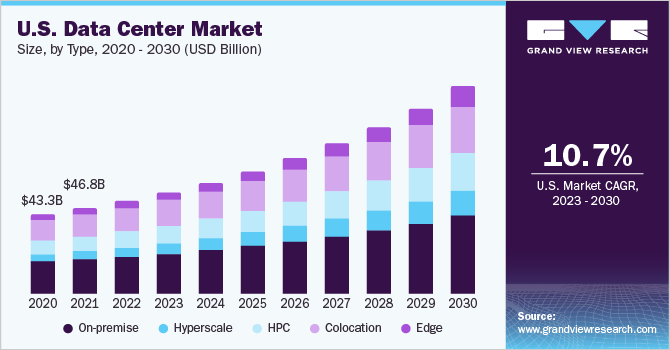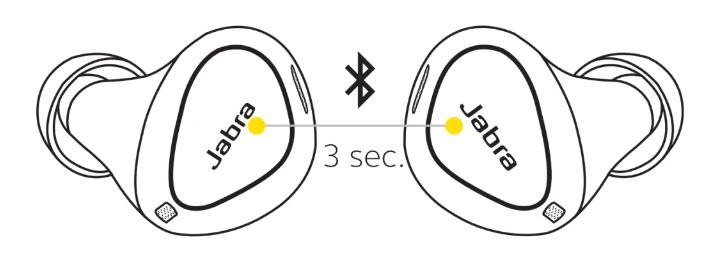In the modern era, data centers play a vital role as the core of our interconnected society. These technological centers host servers, storage systems, and networking gear that drive various services from streaming to financial activities. With the exponential data growth from businesses and individuals, the need for reliable, effective, and scalable data centers is on the rise. This article provides a detailed overview of the data center market, covering trends, challenges, and growth prospects.
Toc
The Data Center Landscape

Market Size and Growth
The global data center market has experienced significant growth, reaching a valuation of USD 194.81 billion in 2022. Projections suggest a compound annual growth rate (CAGR) of 10.9% from 2023 to 2030. This growth trajectory is fueled by the increasing digitalization trends across various industries, driving the demand for robust data infrastructure to support evolving technological requirements.
Drivers of Market Expansion
– Technological Advancements: The continuous evolution of technologies like edge computing, 5G networks, and artificial intelligence has become the cornerstone of driving the demand for data centers. These innovations are not just influencing but reshaping the entire landscape of data processing and storage. They enable faster, more efficient operations in our increasingly interconnected world, setting the stage for unprecedented growth and innovation in data management.
– Adoption of Cloud Computing: Robust data centers are pivotal in the realm of hosting applications and managing computing resources for cloud services. The ever-growing shift towards cloud-based solutions is fueling the demand for scalable and secure data center facilities. The surge in digital transactions and services necessitates an infrastructure that can keep up with the escalating volume of data and the dynamic nature of cloud-based services.
– Digital Services: The world of online services, ranging from e-commerce platforms to video streaming services, is expanding rapidly. This growth drives the urgent need for scalable infrastructure – a need that data centers are uniquely positioned to fulfill. With digital interactions becoming increasingly integrated into our daily routines, the reliance on data centers to ensure seamless connectivity and efficient service delivery continues to intensify.
– Data Storage Requirements: The exponential rise in data production has put immense pressure on storage capacity and infrastructure efficiency. Both businesses and consumers are generating vast amounts of data daily, highlighting the critical importance of data centers that can adapt and scale to meet the ever-evolving demands of data storage. Flexibility and scalability are the keys to staying ahead in this data-driven era.
Green Data Centers: As sustainability takes center stage, the trend towards adopting energy-efficient solutions in data management is on the rise. Green data centers are leading the charge by harnessing renewable energy sources such as solar, wind, and hydroelectric power to reduce reliance on fossil fuels. This shift not only brings about operational cost savings but also aligns with corporate sustainability objectives, propelling the movement towards eco-friendly data management practices.
Micro Data Centers
With the rapid deployment of 5G networks, the demand for accelerated data transmission speeds has intensified. This has led to the emergence of compact data centers known as micro data centers. These data centers are strategically located close to end-users to provide edge computing services swiftly. By reducing latency concerns, micro data centers cater to applications that require real-time responses, ultimately enhancing user experiences. Moreover, they play a pivotal role in supporting cutting-edge technologies such as the Internet of Things (IoT) and autonomous systems.
Challenges and Opportunities in the Data Center Landscape
Energy Consumption
One of the critical challenges faced by data centers is their substantial energy consumption levels. Balancing growth objectives with sustainability targets is a pressing issue for data center operators. To address this, embracing energy-efficient practices and exploring renewable energy solutions can significantly reduce the environmental impact of data centers. By improving operational efficiency and cost-effectiveness in the long run, these measures pave the way for a more sustainable future.
Security and Resilience:
In today’s digital landscape, data centers are constantly under threat from cybersecurity risks. The rising complexity and frequency of these threats pose a significant challenge to data center security. It is imperative for organizations to establish robust security measures to safeguard against potential breaches. Additionally, implementing comprehensive disaster recovery protocols is essential to ensure uninterrupted operations and maintain data integrity in the event of system failures.
Regulatory Compliance:
Within the realm of data centers, regulatory compliance is a complex and multifaceted landscape that necessitates strict adherence to a myriad of environmental regulations and stringent data privacy standards mandated by governments on a global scale. These regulatory compliance initiatives not only function to preserve the environment and safeguard sensitive information but also propel the adoption of sustainable practices, compelling data centers towards the implementation of eco-friendly operations, and efficient resource management strategies.
Investment and Innovation:
The appeal of data centers as highly profitable investments arises from the sector’s continual innovation and advancements in technology. Investors are particularly attracted to data center assets due to ongoing advancements in cooling technologies, the emergence of modular designs that offer scalability benefits, and the incorporation of renewable energy sources to bolster sustainability and cost-effectiveness. These innovative developments play a critical role in shaping the future landscape of data centers, fostering an environment ripe with diverse investment opportunities and avenues for growth.
The Future of Data Centers:
As technology continues to evolve, the future of data centers is closely intertwined with the expansion of edge computing infrastructure. The proliferation of edge data centers serves as a critical enabler for the Internet of Things (IoT) devices and real-time applications, providing low-latency connectivity and processing capabilities essential for emerging technologies like autonomous vehicles and smart devices.
Moreover, the trend towards hybrid cloud adoption is gaining traction across industries, with organizations increasingly embracing the flexibility and scalability offered by hybrid cloud models. By integrating public and private cloud environments, organizations can optimize their data management strategies and leverage the benefits of both cloud deployment models. In this hybrid cloud landscape, data center solutions play a vital role in ensuring seamless connectivity, data security, and performance optimization across diverse cloud environments.
AI and Machine Learning Integration:
The demand for high-performance computing for AI workloads is on the rise as more industries across various sectors such as healthcare, finance, and autonomous vehicles are leveraging the power of artificial intelligence and machine learning to drive innovation and efficiency in their operations. With the increasing complexity of AI algorithms and deep learning models, data centers are continuously optimizing their infrastructure by incorporating advanced hardware accelerators like GPUs and TPUs to handle these workloads efficiently, paving the way for cutting-edge AI processing capabilities that can revolutionize how businesses operate and serve their customers.
Global Connectivity
Interconnected data centers, located strategically around the world in key regions like Silicon Valley, Singapore, and Frankfurt, play a crucial role in fostering seamless data exchange on a global scale. This interconnectedness enables businesses of all sizes, from startups to multinational corporations, to collaborate, share resources, and innovate across different regions seamlessly. The emerging interconnected ecosystems not only enhance data accessibility but also drive new levels of collaboration and innovation among diverse industries such as e-commerce, healthcare, and autonomous vehicles, opening up possibilities for groundbreaking advancements and partnerships that transcend geographical boundaries.
Top 5 data center market research services 2024

Discover the best 5 data center market research services in 2024. Explore factors such as report quality, market coverage, and analytical insights. Optimize your data center strategy today!
1. Gartner data center market research
Focus: Provides in-depth analysis of data center trends, technologies, and vendor landscapes.
Strengths:
- Renowned reputation and expertise in the IT industry.
- Comprehensive reports covering global and regional data center markets.
- Insights on data center infrastructure, colocation, cloud adoption, and emerging trends.
Considerations:
- Gartner research is typically subscription-based, and pricing can be high.
- Reports might be more geared towards enterprise-level needs.
2. IDC (International Data Corporation) data center market research
Focus: Offers a wide range of market research on data center infrastructure, cloud services, and IT spending.
Strengths:
- Strong market coverage with detailed forecasts and analysis.
- Reports on data center hardware, software, services, and user spending trends.
- Insights on regional data center markets and sector-specific applications.
Considerations:
- Similar to Gartner, IDC research often requires a paid subscription.
- Reports might be broad in scope, requiring filtering for specific data center needs.
3. Forrester Research data center market research
Focus: Analyzes data center trends through the lens of business impact and customer needs.
Strengths:
- Actionable insights for data center decision-making and technology adoption.
- Focus on data center efficiency, sustainability, and automation trends.
- User-centric research that considers data center’s role in broader business strategies.
Considerations:
- Forrester reports may also require a subscription.
- Reports might have a less technical focus compared to Gartner or IDC.
4. Mordor Intelligence data center market research
Focus: Provides market research reports on specific data center segments like cooling solutions or micro data centers.
Strengths:
- Affordable research reports compared to larger firms like Gartner or IDC.
- Offers in-depth analysis of niche data center markets and technologies.
- Useful for research on specific data center equipment or trends.
Considerations:
- Less established reputation compared to larger research firms.
- Report quality and depth might vary depending on the specific market segment.
5. Arizton data center market research
Focus: Offers data center market research reports with a global perspective.
Strengths:
- Focus on emerging markets and the growth of data centers in different regions.
- Reports on data center investments, trends, and regulations in specific countries.
- Cost-effective research reports compared to some competitors.
Considerations:
- May not have the same level of detail or brand recognition as Gartner or IDC.
- Website interface might be less user-friendly compared to established research firms.
Choosing the Right Service
Consider these factors when selecting a data center market research service:
- Specific Research Needs: Identify the data center market segment or trend you’re interested in (e.g., global colocation market, AI in data centers).
- Budget: Compare pricing models and subscription options offered by different research firms.
- Report Quality and Depth: Evaluate the research methodology, analyst expertise, and level of detail provided in the reports.
Additional Recommendations
- Seek out complimentary resources and professional publications that provide preliminary perspectives on current data center trends.
- Explore participation in industry conferences or webinars featuring presentations on data center market analysis.
- Utilize complimentary trial periods or sample reports from reputable research firms to evaluate their caliber prior to making a commitment.
By meticulously assessing these leading options and matching their strengths with your distinct research objectives, you can choose the data center market research service that delivers the most beneficial insights for your requirements.
Conclusion
The data center market stands at the forefront of technological advancements, sustainability initiatives, and innovative solutions. As the digital landscape evolves, data centers are poised to adapt and innovate to meet the evolving needs of businesses and individuals. Whether you are an investor seeking growth opportunities, a business owner navigating digital transformation, or a technology enthusiast exploring the latest trends, a deep understanding of the data center ecosystem is paramount. Get ready to embrace the data-driven future that lies ahead!
In this comprehensive article, we have delved into the growth trajectory, challenges, and future outlook of the data center market. Whether you are a seasoned tech professional looking for industry insights or an inquisitive observer keen on understanding transformative technologies, staying informed about the evolving data center landscape is key to navigating the digital age effectively.
















